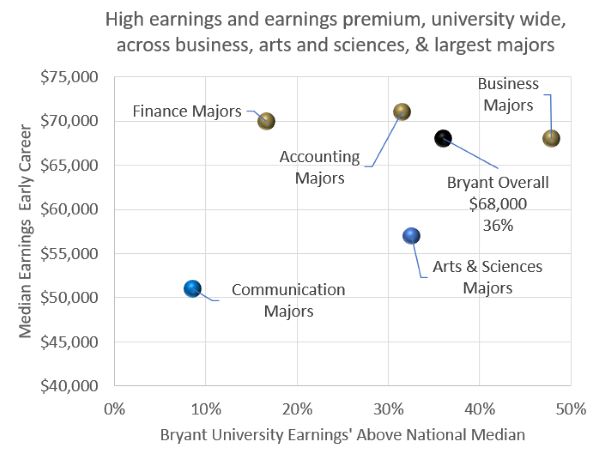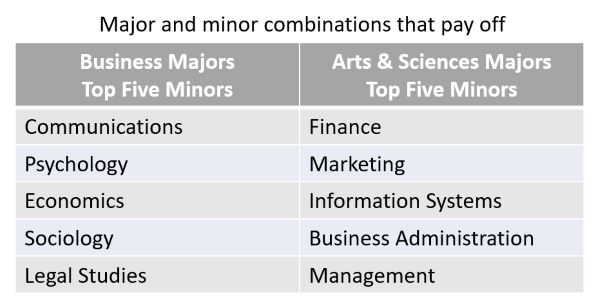Bryant University graduates outperform the national average when it comes to career success, according to a report released by the Federal Reserve Bank of New York. The Fed study, which used the U.S. Census Bureau’s American Community Survey to examine median wages for recent college graduates revealed that Bryant grads earn 36 percent more than the national median, when compared to recent graduates from other institutions of higher learning. Furthermore, only 1 percent of Bryant recent grads were unemployed at the time of a survey conducted by the university, compared to 4.4 percent of recent college graduates across the nation.
The Fed findings mirror recent data on post-graduation outcomes compiled by the university’s Office of Institutional Effectiveness and Strategy. Bryant Class of 2023 graduates earned the strongest return on investment in the institution’s history, with median earnings of $72,500 in the first six months following graduation — an impressive 6.6 percent increase from the previous year's record-breaking earnings of $68,000.
When broken down by field of study, graduates of Bryant’s College of Business earn 48 percent more compared to the national median wage in early career. In addition, Bryant’s Accounting majors earn 31 percent more and Finance majors earn 17 percent more than the median wage early career. Graduates of Bryant’s College of Arts and Sciences saw similar results, earning 32 percent more when compared to the national median for students in general social sciences fields, which are closely aligned with Bryant’s College of Arts and Sciences course offerings. Bryant’s Communication majors earn 9 percent more compared to the national median wage.

These successes are fueled by the university’s Vision 2030 Strategic Plan and a commitment to transformational learning experiences and exceptional outcomes, says Bryant University President Ross Gittell, Ph.D.
READ MORE: Bryant’s Vision 2030 Strategic Plan
"The Federal Reserve's report on recent college graduates further underscores the outstanding return on investment of a Bryant education," says Gittell. "Bryant graduates’ earnings are significantly higher than the national median, both overall and across disciplines. These impressive outcomes underscore the impact of our integrated learning approach, which empowers students to actively participate in research, experiential learning, and professional development activities beyond the traditional classroom.
“These results also affirm our university’s commitment to interdisciplinary education with intent, requiring all students to take a minor in a field outside of their degree major; our arts and science majors must take a business minor, and business majors an arts and sciences minor,” Gittell adds. “This strengthens our education’s alignment with labor market skill requirements, confirming that Bryant is making good on our promise to prepare students for success in an ever-changing world."
Bryant’s graduates enter the workforce empowered by the institution's integrated curriculum as well as opportunities to engage in collaborative learning with faculty, gain international experience, and develop career readiness and leadership skills.

“Bryant’s focus on experiential learning is built into every aspect of our career-focused curriculum, ensuring that it is both current and relevant to the needs of employers and to the global economy,” notes Bryant Provost and Chief Academic Officer Rupendra Paliwal, Ph.D. “When Bryant students go out for job interviews, they do not just talk about what they have learned in college, but also what they have done. The real world-ready experience they have obtained means that they are ready to roll up their sleeves and contribute from day one of their employment.”
Career development is woven throughout Bryant students’ educational experience. In addition to the industry connections provided by the university’s experienced faculty and a 50,000-strong alumni network, Bryant’s nationally recognized Amica Center for Career Education supports students every step along their professional pathway, from finding an internship to securing their first job.
These career-readiness opportunities also support the university's mission to promote economic and social mobility. Per a 2023 analysis by the Office of Institutional Effectiveness and Strategy, the Class of 2022 graduates with the strongest economic outcomes included alumni of color and Federal Pell Grant recipients, the latter of whom reported median earnings of $72,000 annually within six months of graduation. The Class of 2022 also boasted a female to male earnings ratio of 96 percent compared to 82 percent nationwide.
Bryant’s superior return on investment has been confirmed in recent prestigious national rankings, as well. In September, The Wall Street Journal found Bryant University to be among the top 7 percent of higher education institutions in the nation, according to its annual America’s Best Colleges 2024 rankings. In addition to Bryant’s overall ranking, which rose 116 spots from 227 in 2022 to 111 in 2023, the publication ranked the university 54th in the nation for salary outcomes, as well.
According to the latest U.S. News & World Report standings, Bryant is the sixth best regional university in the Northeast and top among its peers for educational value and social mobility. In addition to the regional ascent, from 7th in 2023 to 6th in 2024, Bryant was named among the best regional universities for value, landing at number 32 in the northern United States. U.S. News also recognized Bryant in the social mobility category, ranking the institution 119th in the nation.
Per the Princeton Review’s annual guidebook for prospective college students, Bryant is one of the best schools in the Northeast in 2024. The guidebook also placed Bryant in the top 25 in three new categories: Best College Library, Most Active Student Government, and Students Love Their School Teams.
RELATED ARTICLE: Bryant earns accolades from the Princeton Review